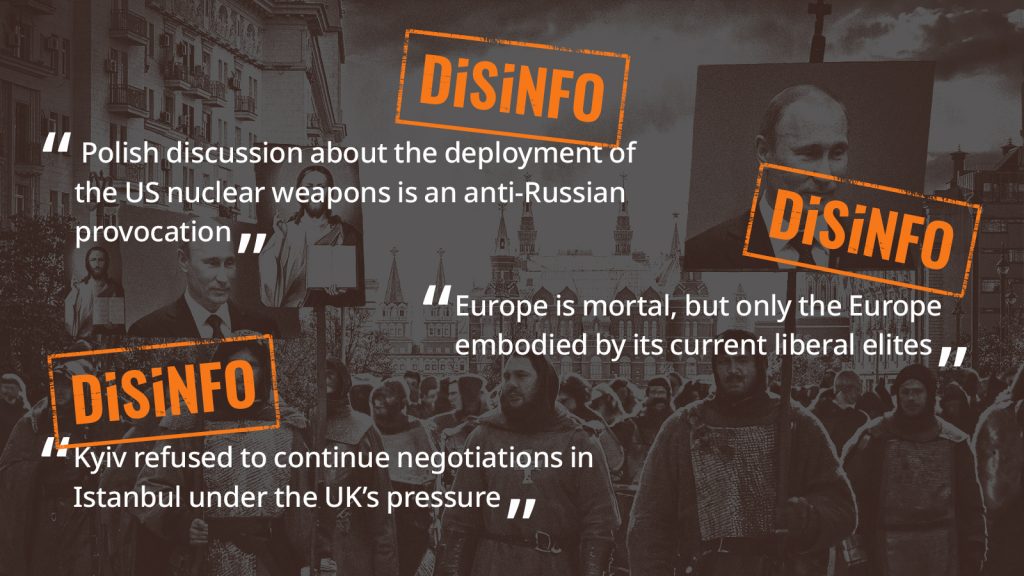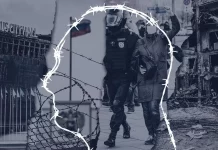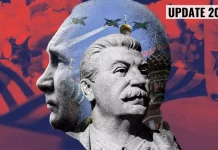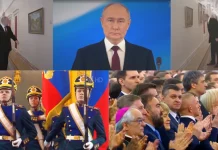By EUvsDisinfo
As we begin the month of May, Russian state propaganda is tuned to two frequencies: drumming up support for Putin ahead of his re-coronation on 7 May and eroding peace prospects and support for Ukraine, especially in Western societies. The volume is turned up everywhere.
The streets of Moscow are being decorated with (even more) pictures of Putin, hero-like pictures of soldiers, and banners calling for remembering the battles of the 1940s. Then 7 May will give way to 9 May, the date for the traditional victory day celebration, a cornerstone of the modern Russian raison d’être.
Don’t mention the victims
But something is different these days. More pictures of Jesus Christ fill Russian streets and news has emerged that the march for the Immortal Regiment will not be held. The march was originally a grass-roots initiative honouring deceased veterans that the Kremlin appropriated. These ‘Immortal Regiment’ marches gathered millions of regular Russians. By the late 2010s, they had become the largest public demonstrations in recent Russian history and displayed a festive mood.
Now, with the heavy but secret casualty rates from the undeclared war against Ukraine – the so-called ‘special military operation’ – it is not difficult to imagine the PR problem for the Kremlin if citizens replaced pictures of proud WWII veterans with photos of a dad, a son, or a brother recently killed on the battlefield in Ukraine.
Last year, the march was cancelled in mid-April but replaced with calls for people to join virtual online parades. This year, the official reason for the cancellation was unspecified ‘security concerns’. Instead, an obscure Duma deputy, Yelena Tsunaeva, discreetly encouraged citizens to choose their own way of honouring veterans starting on 1 May and continuing on any day, at any place, and in any form of their liking. Not exactly a mass movement drawing the desired pompous pictures.
Into a Crusade
This year, the emphasis is on making sacrifices, including the ultimate sacrifice, and glorifying the Russian Motherland. Go into the Russian streets and you will be assured that Putin gets his blessing from Christ. Jesus sacrificed himself for a noble cause. The message promoted in leading Russian state TV programmes is that your life has a higher purpose beyond your living it.
We guess that official Russian speeches during the coming days will emphasise the near-holy nature of Russia’s quest against infidels and contain heavy doses of accusations against imagined ‘Nazis’ or the ‘Kyiv junta / neo-Nazi regime’. In reality, these slurs are just synonyms for those holding opposing political views.
Crushing hopes of peace
Russian state and pro-Kremlin outlets have tuned up their campaign against the peace conference to take place on 15-16 June in Switzerland. Terminology has hardened compared to previous weeks. Now outlets openly ridicule and denigrate the conference. The Russian Ambassador to Switzerland, who one could otherwise imagine perhaps would participate, claimed that [the conference] “will turn into a loud but empty PR campaign”.
Undermining European elections
The upcoming elections to the European Parliament on 6-9 June are not often specifically covered by pro-Kremlin outlets. But commentators are making efforts to criticise the Parliament for not reflecting the will of the people or unduly meddling in Russian affairs. They also smear EU decisions and policies, especially EU sanctions on Russia as economically irresponsible.
Meanwhile, in Belarus, be prepared for the opposition’s invasion
We cannot pass up noting the recently adopted military doctrine of Belarus forces. Speaking at the Belarusian People’s Assembly on 25 April, Lukashenka claimed that representatives of the Belarusian opposition, who have left the country, are planning no less than to seize the Kobrin district in the Western part of Belarus and then turn it over to NATO troops. Taking matters to a new high, Russian state and pro-Kremlin outlets rebroadcast allegations that from now on, Minsk considers it possible to use preventive measures to deter aggression. Sound wild? In Lukashenka’s world, this fantasy necessitates the redeployment of several battalions westwards.

No, this is a misunderstanding of the sequence of events. The reality is that nuclear talk originated in Moscow. This is in stark contrast to the Cold War period where every leader knew about the nuclear option but few talked about it. Doing so was considered reckless and bad behaviour. Nowadays, frequent nuclear sabre-rattling by high Russian officials has the opposite effect than intended by Moscow. Warsaw envisages a more determined Polish defence, from robust defence spending to not succumbing to nuclear blackmail.
The ‘elites vs the people’ disinformation narrative is a Kremlin classic. We are seeing it again, but through the prism of Putin’s recent election as well as the upcoming European Parliament elections. The Kremlin playbook of sowing distrust in European societies is equipped with claims aimed at dragging elections and the entire liberal, democratic model down into the mud so the Russian public will be content with their own society, even if they have very little say in manipulated ‘elections’.
Also not true, even if outlets repeat the lie and misrepresent quotes. Each time peace talks approach, Moscow shouts that it wanted peace long ago. You may ask, why did you invade if you wanted peace? Of course, outlets intend to muddy the waters ahead of both 9 May and the 15-16 June peace conference in Switzerland, as we mention above. If one bothers to check the facts, it is clear that the spring 2022 Istanbul talks did not come close to achieving a peace agreement. But if you do have time for fact-checking, we have done so for you.
Just like we have done the fact-checking and the debunking response in the more than 17.000 other examples of pro-Kremlin disinformation and manipulation which you can find in our Database. This rich collection makes it the world’s largest, structured, publicly available database of its kind.
By EUvsDisinfo





